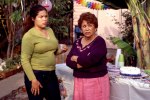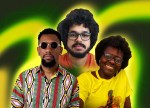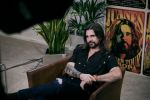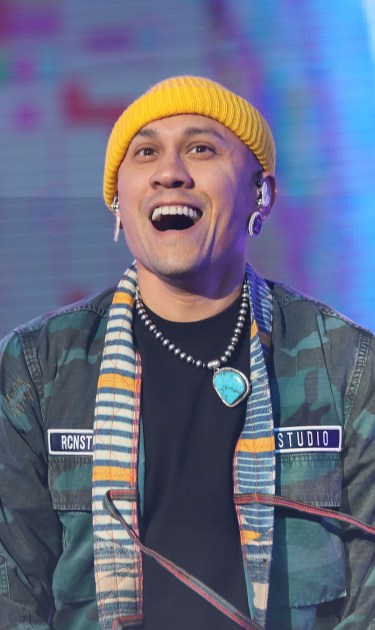Decades before he helped start the Black Eyed Peas, Taboo Nawasha was a young Jimmy Gomez, wading through a complex identity. His grandmother–a Native American from the Shoshone and Hopi tribes–helped raise him alongside his single mom. Nanny, as she was affectionately called, shared many stories of her life back in Jerome, Arizona. His grandfather, who the artist didn’t grow up around, was from Sonora, Mexico.
“I didn’t really understand my Native ancestry until she started breaking it down about where we come from,” Taboo tells Remezcla. “But all along that journey of trying to connect with my Native roots, I also had an urge to connect with my Mexican roots, or my Mexican-American roots both of which are indigenous foundations prior to colonization.”
A yearning to know more about his heritages led Taboo into a deep dive. He educated himself about both his Native and Mexican roots and pushed through insecurities about his Spanish-speaking by practicing more. “I started thinking to myself, like, ‘Yo, why don’t you just be proud of who you are and represent to the fullest?’” he recalls.
This unabashed and earnest embrace of one’s identity is the subject of Taboo’s new children’s book, A Kids Book About Identity. In the book, the MC and father of four defines identity for his young audience and introduces part of his own identity: a dancer, a founding member of the Black Eyed Peas, a husband, a dad, and the list goes on. A Kids Book About Identity is part of a book series published by A Kids Company About (AKBA), of which Taboo is an investor. The book’s English version is already available, and the Spanish version will be available on Dec. 10.

“There’s a beginning, a middle, and an end to this journey–and it starts with my kids. It sparks from being a parent and wanting to empower my kids to be proud of who they are,” he says. “A lot of times, you’re labeled as ‘Other’ now. Me being Mexican and Native, it’s like ‘Hispanic’ or ‘Latino,’ and then you have ‘American Indian.’ And then my wife is Filipino, so my kids are like, ‘Well, where do we fit in?’ So it’s about really understanding identity, embracing it, and being proud of who you are.”
Below, Taboo talks to Remezcla about his new book, the intentionality behind having a Spanish version of the book, and discovering his ever-evolving identity.
The interview has been lightly edited and condensed for clarity purposes.

Why was this book necessary to write?
First and foremost, I’m a father. I’m a proud husband, but at the end of the day, I’m just “Dad.” When I come home and I’m not wearing a Black Eyed Peas cape, I’m dealing with drop-offs, pick-ups, breakfast, dinner, baths. I’m doing everything to be present in my kids’ lives on a daily basis. I wasn’t really in my first son Josh’s life a lot because I was constantly touring. I learned about being present in my kids’ life. I learned about reading to my kids at night. It’s a very valuable asset to our connection.
I always said to myself, “I eventually want to get into writing kids’ books because I’m in the kid space now.” I started with Marvel Comics, [and] doing some stuff with Cartoon Network. My wife is the one that pointed out the love and support for AKBA. Prior to me writing the book, I was inspired by the idea of these books being different themes and conversations that, as parents, we can have with our kids and as a family that sometimes are uncomfortable–like divorce, racism, or even about white privilege. As a Native American and Latino– and my wife’s Filipino–we have to have conversations that sometimes may poke the hornet’s nest.

How did you identify as a child?
My mom gave birth to me, and I’ll always be grateful and thankful. My grandmother gave birth to Taboo Nawasha–what I was to become on that stage. It started in her living room, at five years old. She would say, “From Los Angeles, California, give it up for Jimmy Gomez!” That energy, that spark of life and spirit came from her love and appreciation for our ancestry, because our ancestry was rooted on the drum, rooted on the dance, rooted on the celebration and prayer. Dancing to us was prayer. That was something that I connected with more than just only being Chicano. I felt our Native ancestry, and I knew this is what I wanted to embrace.
Then I started understanding the beauty of both cultures when I would hear “Chicano,” when I would hear “pocho.” Those are trigger words for me because I didn’t understand what that meant. “Pocho” is like a Mexican-American: He’s not Mexican enough because he wasn’t born in Mexico, and he’s not American enough because he’s Mexican. It was so weird hearing these things as a kid. We’re systematically trained to have fear of not being enough. That’s where the identity urgency comes from. And I said to myself, “You know what? I’m enough inside right here. I don’t have to tell you. I’m just going to be about it.”

“We’re systematically trained to have fear of not being enough. That’s where the identity urgency comes from. And I said to myself, ‘You know what? I’m enough inside right here. I don’t have to tell you. I’m just going to be about it.’”
How did your self-identity evolve as you entered adulthood?
As I got older, I started really embracing the indigenous foundation, both of Tenochtitlan, which was Mexico prior to it being colonized, and Turtle Island, which was North America prior to colonization. I’m a big history nerd and I really love doing deep dives about our ancestors. I started researching my place in Jerome, Arizona because I would be remiss if I did not channel the energy that my grandmother left behind after she passed away. I tapped into the idea of being a student of both cultures, wanting to have a cultural exchange, and listening to elders.
Tell us about the decision to have a Spanish version of your book.

I had to. I had to give back because I never learned a native language on my grandfather’s side. I really didn’t know his indigenous roots. I wanted to have Spanish-speaking kids be able to embrace this book and be proud of who they are, as well. I had a lot of friends that were embarrassed about ESL, like me. It has a connotation, which is dumb because I love being bilingual. When I go to different countries and I’m able to speak Spanish, they’re like, “Oh, wow, we didn’t even know.” I spoke Spanish at the Billboard Awards and I was proud of how I articulated every single word and I slowed myself down. People felt that.
Now when people read it that are from Mexico or from South America, or from other Spanish-speaking countries, they’re going to see “indígena,” they’re going to see ‘mexicano.’ So for me to leave those sprinkles of the energy that I’m on in English and in Spanish, and let people know how proud I am to tap the indigenous perspective, that’s what I’m doing. I want kids to be inspired by the roots and the foundation of wherever they come from, too.
How did you learn Spanish, if you weren’t raised with the language at home?
I learned broken Spanglish, pocho Spanish, growing up. My mom spoke it. My uncle didn’t speak it that well, but I heard it. But really, it was my mom’s boyfriend, Julio. He was from Morelia, Michoacan in Mexico, and he taught me a lot about real Mexican culture, not Chicano East LA vibes, and I started listening to his Spanish. We would watch lucha libre together, and Sábado Gigante. I started understanding, and then I started traveling. I learned how to speak Spanish by practicing and slowing myself down.
Do you feel like forming a concrete sense of self-identity is especially challenging for Latine people? If so, why?
It’s OK to keep on learning. Once you put a concrete foundation on something, there’s no room to learn and to continue making mistakes. That’s how you get better. That’s how I’ve gotten more comfortable, is by making mistakes and being like, “Oh wow, I flubbed that word but it’s OK. Next time I’m going to not flub that word.”
Why is identity important to you?
It makes up who you are. I feel like sometimes people may not find their identity by themselves. Maybe they find a crew. For example, like me finding my crew–will.i.am and Apl–to become a brotherhood called Black Eyed Peas. We found our identity as a trio. We found our identity as MCs, as dancers, as songwriters, as producers, and we said to ourselves, “It’s us against the world.” And within that brotherhood, we started really embracing our individual identities. And so sometimes you find your identity where you least expect it– within a crew, your tribe, your friends—because sometimes you need that self-assurance that’s not your mom or your dad to be able to support you and to give you that confidence to be exactly who you want to be.




